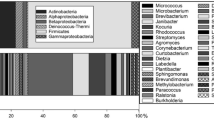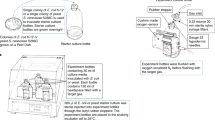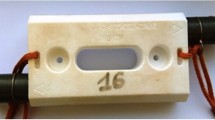Abstract
WE have investigated the possibility that common terrestrial microorganisms carried by spacecraft can survive entry into the atmosphere of Jupiter. In our experiments we used Escherichia coli B, Serratia marcescens, Aerobacter aerogenes, and Bacillus subtilis, routinely cultured in basic mineral medium1 with glucose (30 g/l.) as the carbon source, or in trypticase soy broth (TSB, 30 g/l.), sterilized by autoclaving at 15 pounds inch−2for 15 min. Plating was done using TSB with 1.5% agar.
This is a preview of subscription content, access via your institution
Access options
Subscribe to this journal
Receive 51 print issues and online access
$199.00 per year
only $3.90 per issue
Buy this article
- Purchase on Springer Link
- Instant access to full article PDF
Prices may be subject to local taxes which are calculated during checkout
Similar content being viewed by others
References
Bird, C. W., and Molton, P., Biochem. J., 104, 987 (1967).
Michaux, C. M., Fish, jun., F. F., Murray, F. W., Santina, R. E., and Steffey, P. C., in Handbook of the Physical Properties of the Planet Jupiter, NASA SP-3031, 95 (1967).
Author information
Authors and Affiliations
Rights and permissions
About this article
Cite this article
MOLTON, P., PONNAMPERUMA, C. Survival of Common Terrestrial Microorganisms under Simulated Jovian Conditions. Nature 238, 217–218 (1972). https://doi.org/10.1038/238217a0
Received:
Revised:
Issue Date:
DOI: https://doi.org/10.1038/238217a0
This article is cited by
-
Three dimensional electron microscopy reveals changing axonal and myelin morphology along normal and partially injured optic nerves
Scientific Reports (2018)
-
Nogo receptor 1 regulates Caspr distribution at axo-glial units in the central nervous system
Scientific Reports (2017)
-
Axon diameter relates to synaptic bouton size: structural properties define computationally different types of cortical connections in primates
Brain Structure and Function (2017)
-
The metabolic efficiency of myelinated vs unmyelinated axons
BMC Neuroscience (2011)
Comments
By submitting a comment you agree to abide by our Terms and Community Guidelines. If you find something abusive or that does not comply with our terms or guidelines please flag it as inappropriate.



